Upcoming events
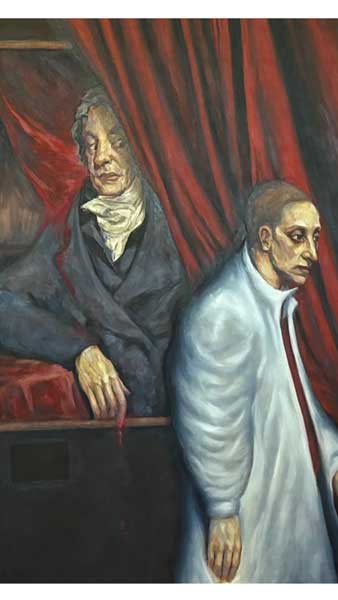 Working with traumatic histories: how can Liverpool’s heritage institutions represent histories and legacies of ‘scientific’ racism?
Working with traumatic histories: how can Liverpool’s heritage institutions represent histories and legacies of ‘scientific’ racism?
ESRC Festival of Social Science and NML Collaboration Fund event
Monday 3 November, 2025
University of Liverpool
School of Law and Social Justice
This one-day workshop brings together heritage professionals, academics, artists and members of the public to explore histories and legacies of ‘scientific’ racism in Liverpool heritage institutions.
Museum displays and university curricula have historically played an important role in teaching and promoting racism. The medical, anthropological and anatomical collections of Liverpool heritage institutions include objects, books, specimens and ancestral remains that were used to spread pseudoscientific racial hierarchies during the 18th, 19th and 20th centuries.
How should Liverpool’s heritage institutions respond to histories and legacies of ‘scientific’ racism? What needs to be done to acknowledge museums’ and universities’ responsibility in forming and spreading racist ideologies? Is there a way to represent heritage institutions’ historic complicity in ‘scientific’ racism without repeating and perpetuating racial trauma?
The workshop addresses these questions from a range of perspectives. There will be keynote presentations by Dr Rebecca Martin, Research Project Officer at the Pitt Rivers Museum, University of Oxford, and Michelle Peterkin-Walker, a socially-engaged artist, activist and filmmaker. The programme includes group discussions about items in collections held by National Museums Liverpool and the University of Liverpool.
The workshop will inform ongoing work to design new displays at the redeveloped International Slavery Museum.
See a full agenda for the day here.
Image: They Look Past the Truth’ by Anna-Louise Loy.
Joint LCF x CHASE seminar: Prof. Patrícia Viera: 'Amazonian Metamorphoses: Poetry and Art from a Living Forest'.
12 November 2025, 1-2pm
502 Building, Teaching Room 5 (TR5)
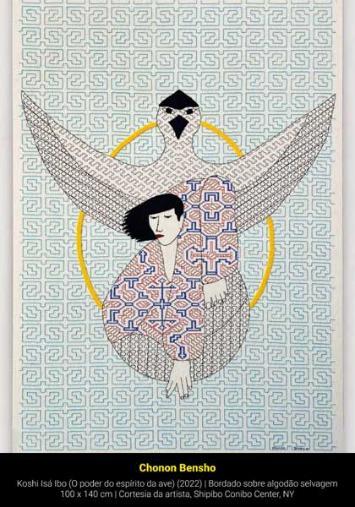 All welcome!
All welcome!
The talk contrasts the extractivist view of the Amazon, as monetizable resource, with the Indigenous conception of the territory as a living forest. It explores Indigenous understandings of life in Amazonia as continuous metamorphosis expressing the ontological instability of all beings.
Focusing on the poetry of Ana Varela Tafur (1963–) and the art of Shipibo-Konibo artist Chonon Bensho (1992–), both from the Peruvian Amazon, it argues that their works exemplify phyto- and zoometamorphoses mirroring the Amazonian ontology of becoming.
Patrícia Vieira is Research Professor at the Center for Social Studies of the University of Coimbra in Portugal and specialises in Latin American and Iberian Literature and Cinema, Utopian Studies and the Environmental Humanities. She currently heads the ERC Consolidator project 'ECO – Animals and Plants in Cultural Productions about the Amazon River Basin' and co-coordinates this Gerda Henkel Foundation funded project 'Resilient'.
Image: Chonon Bensho - Koshi Isá Ibo (O poder do espírito da ave) (2022)
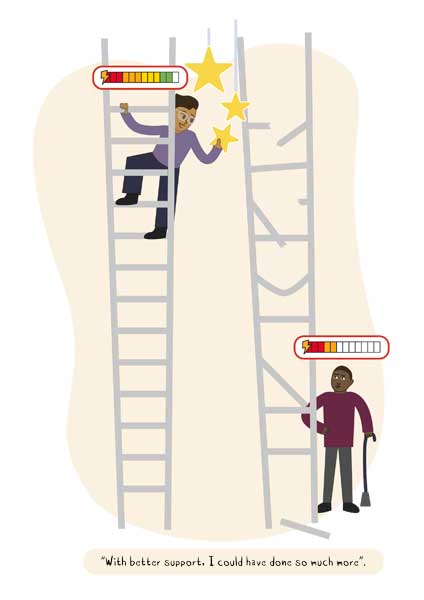 Webinar and Guidance Launch:
Webinar and Guidance Launch:
Creating More Inclusive Workplaces for Academics with Energy Limiting Conditions
Monday 24th November 2-3pm (GMT)
Online
Join us as we launch guidance on systemic changes and individual adjustments to create more inclusive workplaces for academics with energy limiting conditions (ELC).
Our guidance is for:
• academics with ELC
• line managers and human resources professionals
• EDI leads, colleagues and union representatives
• funders, publishers and conference organisers
The guidance is based on research carried out as part of an ISRF Political Economy Fellowship.
Past events
Health Tracking for Women
22 October 2025
The Shed @ Baltic Creative Campus
49 Jamaica Street, Liverpool L1 0AH
Health tracking tools often prioritise men’s bodies and lifestyles, often failing to account for women’s unique experiences, such as hormonal fluctuations, reproductive health needs, unpaid care work, or conditions like endometriosis. This oversight not only limits the usefulness of these tools, but also risks reinforcing gendered gaps in health knowledge.
This workshop takes a step toward addressing these issues by focusing specifically on women aged 18-35. Through fictional story completion exercise and group discussion, participants will reflect on women’s encounters with wearables and apps, imagining how these tools could be reimagined to better support women’s health and wellbeing.
Colonialism, Race & Health: Visions of Black health and healing
13 September 2025, 12pm
The Black-E - Main Space
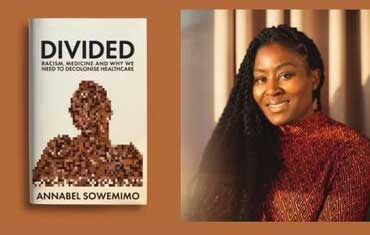
In this talk, delivered as part of the British Science Festival, doctor, academic, activist and writer Annabel Sowemimo will share her widely acclaimed and timely analysis of racial health disparities and the problem of racism in medicine.
Uncovering connections between science and slavery in Liverpool
Saturday 13 September
The Black-E
Join researchers from the School of Biosciences (University of Liverpool) for a tour through Liverpool’s streets and investigate some of the hidden histories of slavery in the city, part of the British Science Festival.
Blending a walk with a workshop, during this 90-minute ‘walkshop’ you’ll explore how slavery was used to fund Liverpool’s growth and establish it as a place of science and learning.
We’ll talk about some of the scientific figures and institutions that benefitted from slavery and spread pseudoscientific myths about Black people. And we’ll discuss how these legacies shape persistent health disparities for Black communities today.
Annual Frances Ivens Lecture 2025
Tuesday, June 24 · 5 - 7pm
Seminar room 5, University of Liverpool Management School
From deceptive mothers to deadbeat dads: DNA ‘fingerprinting’ and state family-making in Thatcher's Britain’, by Professor Roberta Bivins, University of Warwick

In this lecture Prof Roberta Bivins from the University of Warwick will explore the emergence of 'genetic borders' and their unexpected effects on understandings of families and fatherhood since the mid-1980s.
While migrant and ethnic communities in Britain have often been considered medically 'hard-to-reach', they have in fact played a vital role in UK biomedical innovation. The swift diffusion and legal acceptance of one such innovation, DNA profiling, relied on demand from new migrants and their families. Moreover, the adoption of DNA evidence in migration appeals in turn powered important changes not just at the border but across British society. In this talk, I will explore the emergence of 'genetic borders' and their unexpected effects on understandings of families and fatherhood since the mid-1980s.
Creative methods workshop: the video essay
May 14th 10:00am to 16:00pm
Lecture, followed by Workshop (Lunch Provided)
The Gilmour Room, Liverpool Guild of Students
The Centre for Health, Arts, Society and Environment (CHASE), Centre for Culture and Everyday Life and the Department of Languages, Cultures and Film invite you to participate in a creative methods workshop on the video essay.
Overview
In an online world dominated by the audiovisual, video essay-making is rapidly becoming a core academic skill for research and analysis, across disciplines. (Lee 2021; O’Leary 2023). This workshop will focus on interests across disciplines in humanities, social sciences, public health and environmental research interested in creative methodologies and their capacity to interrogate different kinds of data and tackle complex challenges.
It will encourage participants to explore the specific affordances of the video essay, considering how the specific interactions between images, sound and text alter our traditional understanding of knowledge production. This (relatively) new form of research also requires new approaches to evaluation, critical engagement and archiving as well as the understanding of sites and platforms for dissemination and digital publishing.
The workshop will provide a means to critically explore the formal and methodological parameters of the video essay: how is it defined? In what ways is it different from the essay film? (Is it different?) How does it sit alongside other visual methods? What does the video essay offer fields such as visual anthropology/sociology? How can it be productively utilised as a form of ethnographic or autoethnographic and critically reflexive knowledge production?
Presenter biography
Alan O’Leary is Associate Professor of Film and Media at Aarhus University and Visiting Researcher at University of Leeds, where he was Professor of Film and Cultural Studies until 2021. He has published three monographs, including a study of the political film classic The Battle of Algiers (Mimesis, 2019), and has co-edited several book collections and special issues on cinema and on academic filmmaking. He is an influential practitioner and theorist of the academic video essay and has published video essays in venues including 16:9, ZFM, and [in]Transition, where he is also co-editor. His Men Shouting: A History in 7 Episodes was awarded best video essay in the British Association of Film, Television and Screen Studies (BAFTSS) Practice Research Awards 2024. His ‘Manifesto for a parametric videographic criticism’, which argues for an experimental approach to the academic video essay, appeared in NECSUS in 2021. At Aarhus, he teaches short film production as well film and media history and has run several interdisciplinary workshops designed to help scholars investigate the utility of the video essay for their own teaching and research.
Ecogrief and its consolations: a colloquium
15th May 2025 10:30-3:30; School of the Arts Library, 19 Abercromby Square
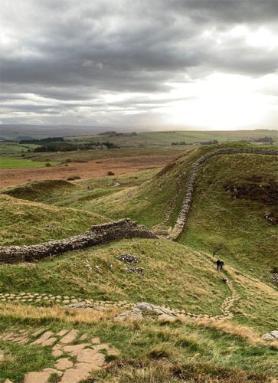 The sudden felling of the ancient tree at Sycamore Gap on Hadrian’s wall on 27th September 2023 gave rise to public outcry which attracted wide-spread media coverage.
The sudden felling of the ancient tree at Sycamore Gap on Hadrian’s wall on 27th September 2023 gave rise to public outcry which attracted wide-spread media coverage.
The response was immediate, deeply felt, and intensely personal, as evidenced by the deluge of messages to the National Trust (NT) and Northumbrian National Park (NNP), the two bodies responsible for the Sycamore Gap site. Both organisations commissioned artwork marking the tree and reactions to its felling. These works of commemoration are analogous to two consolation poems from the late 1300s, the anonymous Pearl and Chaucer’s Book of the Duchess, which look to the natural world for solace.
This Colloquium will bring together representatives from the Environmental Humanities, poets and celebrants, and the NT and NNP to explore causes and expressions of eco-grief and consider how institutions and individuals might best respond. Could what we know about human bereavement illuminate grief over the loss the natural world (eco-grief)?
DaDa Fest Ignite roundtable: Using creative workshops to imagine better futures of care for and with people with energy limiting conditions
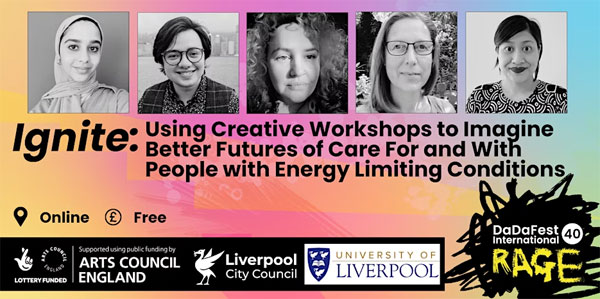
Monday 17th March 12-2pm
Online
At this roundtable discussion we’ll hear from 5 artists (Khizra Ahmed, Khairani Barokka, Julian Gray, Mish Green, Louise Kenward) involved in a research project led by University of Liverpool and Liverpool Hope University.
The project used online creative workshops to explore better futures of care for people with Energy Limiting Conditions. Building from the rage and exhaustion people experience due to the inadequate care currently available, workshops used zine making, creative writing, fairytale writing, drawing, collage and mixed-media to collectively build ideas of better futures.
The project was funded by the Arts and Humanities Research Council. More project information can be found here.
The Black Researcher as living and bodily archive
The Black Researcher as living and bodily archive: Racial trauma, resistance, and community transformation with Guilaine Kinouani
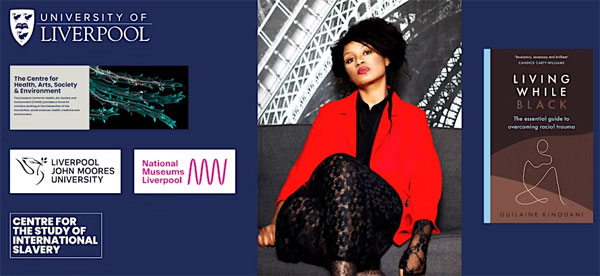
Thu, 6 Mar 2025 12:00 - 15:00 GMT
Room 113
126 Mount Pleasant Liverpool L3 5SR
Although the whiteness of the curriculum and the violence of the archive continue to come under vast amount of scrutiny and criticism from all academic fields (Teo, 2002; Hartman, 2008; Peters, 2015), there has been little interrogation of their possible consequences in terms of both psychological and physical health for researchers and scholars who are racialised as Black. Yet those whose work and studies involve delving repeatedly into these cultural and historical reservoirs, must routinely witness the atrocities contained therein. The loud silence of empty spaces speaking of purposefully erased stories. The normalisation of dehumanisation, commodification and pathologisation. A key role for the community at large.
In this process, their bodies as living and community archival devices (Kinouani, 2024) will become permeated, imprinted, and often altered by the scholarly encounter.
In The wretched of the earth, Fanon (2004), establishes the devastating pathology of white supremacy and white domination during decolonial wars. Further, he observes that the (post) traumatic effects of white violence on the intellectual colonial subject, which relied heavily on epistemic means, was more transformative and enduring in terms of identity and psychological disturbances.
The invisibilisation of whiteness-related risks associated with scholarly work highlights structural anti-Blackness. If Black intellectual work within white institutions likely pauses risks of racial traumatisation, spaces that centre resistance, and safeguarding for the Black body and the black mind need to exist. This is the purpose of this intervention. To illuminate mechanisms of harm, risks, and mitigation, but also to re-cast the role of the Black researcher in relation to the community, using African epistemology.
Guilaine Kinouani is an award-winning writer, psychologist, group analyst, and thinker. She is the founder of Race Reflections. She taught critical psychology, social sciences and Black studies at Syracuse before her PhD at Birkbeck. Her first book Living While Black (2021) exposes the impact of racism on Black minds and bodies. Her second book, White Minds (2023) is a psychosocial exploration of the quotidian workings of whiteness.
Queer Anatomies: aesthetics and desire in the anatomical image, 1700-1900
Monday 3 March 2025, 12-1pm
Lecture Theatre 2, Life Sciences Building, University of Liverpool
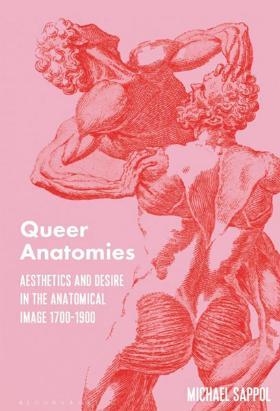 Queer Anatomies explores overlooked examples of erotic expression within 18th and 19th-century anatomical imagery. It uncovers the subtle eroticism of certain anatomical illustrations, and the queerness of the men who made, used and collected them.
Queer Anatomies explores overlooked examples of erotic expression within 18th and 19th-century anatomical imagery. It uncovers the subtle eroticism of certain anatomical illustrations, and the queerness of the men who made, used and collected them.
As a foundational subject for physicians, surgeons and artists in 18th- and 19th-century Europe, anatomy was a privileged, male-dominated domain. Artistic and medical competence depended on a deep knowledge of anatomy and offered cultural legitimacy, healing authority, and aesthetic discernment to those who practiced it. The anatomical image could, however, also serve as a virtual queer space, a private or shared closet, or a men's club. Serious anatomical subjects were charged with erotic, often homoerotic, undertones. Figured within the frame of an anatomical plate, presentations of dissected bodies and body-parts were often soberly technical. But just as often monstrous, provocative, flirtatious, theatrical, beautiful, and even sensual.
Taking brilliant works by Gautier Dagoty, William Cheselden, and Joseph Maclise, and many others, Queer Anatomies assembles a lost archive of queer expression. Diving into these textual and representational spaces via essayistic reflection, Queer Anatomies decodes their words and images, even their silences. With a range of close readings and comparison of key images, Sappol’s book unearths the connections between medical history, connoisseurship, queer studies, and art history and the understudied relationship between anatomy and desire.
Michael Sappol is a historian of the visual cultures of medicine and science and Visiting Researcher in the History of Science and Ideas at Uppsala University in Sweden. For many years he was a historian, exhibition curator and scholar-in-residence in the History of Medicine Division of the National Library of Medicine (USA). Sappol’s work focuses on the history of anatomy, death, and the visual culture of medicine and science in film, illustration and exhibition. He is also the author of A Traffic of Dead Bodies: Anatomy and Embodied Social Identity in Nineteenth-Century America (Princeton, 2002), Dream Anatomy (NIH, 2006), Body Modern: Fritz Kahn, Scientific Illustration and the Homuncular Subject (U Minnesota Press, 2017), and editor of A Cultural History of the Human Body in the Age of Empire (Bloomsbury, 2010), Hidden Treasure (Blast Books, 2012), emeritus curator of Medical Movies. For selected downloads of his work see: https://uppsalauniversitet.academia.edu/MichaelSappol
The (In)Complete Body: Ancient and Early Modern Approaches
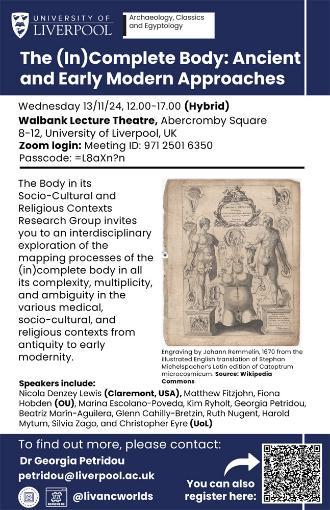 Wednesday 13/11/24, 12.00-17.00, Walbank Lecture Theatre and on Zoom, Abercromby Square 8-12, University of Liverpool
Wednesday 13/11/24, 12.00-17.00, Walbank Lecture Theatre and on Zoom, Abercromby Square 8-12, University of Liverpool
The Body in its Socio-Cultural and Religious Contexts Research Group is pleased to invite you to an interdisciplinary exploration of the mapping processes of the (in)complete body in all its complexity, multiplicity, and ambiguity in the various medical, socio-cultural, and religious contexts from antiquity to early modernity.
Speakers: Matthew Fitzjohn, Fiona Hobden (OU), Marina Escolano-Poveda, Kim Ryholt, Georgia Petridou, Beatriz Marín-Aguilera, Glenn Cahilly-Bretzin, Ruth Nugent, Harold Mytum, Silvia Zago, and Christopher Eyre (UoL)
Keynote Speakers: Prof. Nicola Denzey Lewis (Claremont, USA) and Prof. Christopher Eyre (Liverpool)
Refreshments will be provided at 12.30.
Download the full (In)Complete Body event programme [Word doc 64kb]
Image: Engraving by Johann Remmelin, 1670 from the illustrated English translation of Stephan Michelspacher’s Latin edition of Catoptrum microcosmicum. Source: Wikipedia Commons.
The Interdisciplinary Lab (TIL) - The Social Life of Creative Methods
June 11th 2024
10am-4.30pm
This event will bring together researchers in the social sciences, arts and humanities, artists and practitioners who deploy arts methods and filmmaking. The event will outline the use of creative methods and interdisciplinary methodologies for PGR’s and early career academics interested in, and engaged with, creative methods.
Organised around a series of presentations, conversations and discussions by social scientists, arts scientists, local and international filmmakers and film theorists who pursue artistic collaborative methodologies, the workshop outlines the uses of creative methods and offers practical insights on their potential impact in research and the social.
Pint of Science – Pride, Pregnancy and Protests
 13 May 2024, 7.30-9.30pm
13 May 2024, 7.30-9.30pm
LEAF, Bold Street, Liverpool
Join us for an evening of thought-provoking discussions: from what makes a cook book queer, to the impact new surveillance techniques have on protesters in the US, and how we can help people understand the risks when they give birth.
Also not to be missed, our daring Shots of Science speakers will compete in a series of rapid-fire talks with the winner voted for by you!
QUEER ANTHROPOCENES NOW // NOW QUEER ANTHROPOCENES
 Wednesday, 1 May 2024, 3-5PM at
Wednesday, 1 May 2024, 3-5PM at
The School of the Arts Library
19-23 Abercromby Square
Liverpool L7 7BD
Featuring papers on ‘Misanthropic Camp’ by Dr. Emelia Quinn (Amsterdam) and ‘Between Hopepunk and Misanthropy: Narrating Anthropocene Biodiversity’ by Dr. Pete Sands (York).
This event will consider the intersections of sexuality, literature, science fiction, and the climate.
Emelia Quinn is Assistant Professor of World Literatures and Environmental Humanities at the University of Amsterdam and currently a Visiting Professor at the University of Ottawa. She is author of Reading Veganism: The Monstrous Vegan, 1818 to Present (Oxford University Press, 2021) and co-editor of Thinking Veganism in Literature and Culture: Towards a Vegan Theory (Palgrave, 2018) and The Edinburgh Companion to Vegan Literary Studies (Edinburgh University Press, 2022).
Peter Sands is a Postdoctoral Research Associate at the Leverhulme Centre for Anthropocene Biodiversity and the Department of English and Related Literature at the University of York, UK. His research examines the relationship between animals, technoculture, and ecological futures in the literature and culture of the cold war period and in contemporary speculative fiction.
Run in conjunction with the Joint Liverpool Universities English and Creative Writing (JLUECW) group brings together researchers from across the city’s universities.
Talk by Khairani Barokka: 'amuk: Unpathologising Worlds in a Word'
2-3pm 26 April, 2024, online

University of Liverpool Power, Space and Cultural Change (PSCC) research group and Centre for Health, Arts, Society and Environment (CHASE) are honoured to host an online talk by Dr. Khairani Barokka.
amuk: Unpathologising Worlds in a Word
Khairani Barokka's book amuk (Nine Arches) is the story of how the (mis)translation of a single word pathologised 'natives' in Indonesia, and continues to this day. This is a history of how rage was thieved, and how this relates to continued brutal assaults on indigenous lands, life, and bodyminds, across the genocides of colonial capitalism. It also attempts to thieve it back, and recognises resistance as reclaiming meaning.
In her talk, Okka will connect the lessons of these histories to the community of unbelieved Muslim women with chronic illness she is a part of, and has worked with as part of the Disregarding Disbelief project.
Normative Implications of the Metaphysics of Extra-Corporeal Gestation
11th-12th April 2024, University of Liverpool
Organisers: Katherine Furman, Thomas Schramme, Megan Rawson (University of Liverpool)
In collaboration with the Wellcome Trust programme on The Future of Human Reproduction, Lancaster University
This event will be hybrid.
Booking is free but required.
New reproductive technologies, such as ectogenesis, draw a wedge between the commonly assumed close connection between foetus and maternal agent. This shift has potential metaphysical implications on how we conceive their relation even in cases of natural pregnancy. Is the foetus contained in the future mother or do they form a unity? If gestation can happen outside of the woman's womb, then this seems to support the so-called container model of pregnancy over the parthood model.
This conference will use the current philosophical debate about the metaphysics of pregnancy as a springboard to discuss normative implications of how we fundamentally conceive of the relation between foetus and maternal agent. Whether we opt for a container or a parthood model has important repercussions for how we conceive ethical and legal regulations.
The conference will include a speaker-commentator structure, with colleagues working on ectogenesis from a variety of areas, including metaphysics, ethics and law, as well as science and speculative fiction, and design. We will also be hosting an archive tour of the University of Liverpool’s extensive science fiction collection with Anna McFarlane (University of Leeds) and Tom Dillon (University of Liverpool).
Invited Speakers and Commentators:
Victoria Adkins (University of Greenwich)
Teresa Baron (University of Nottingham)
Andrew Darby (Lancaster University)
Tom Dillon (University of Liverpool)
Mary Donnelly (University College, Cork)
Suki Finn (Royal Holloway, University of London)
Anna McFarlane (University of Leeds)
Claire Pierson (University of Liverpool)
Elizabeth Chloe Romanis (Durham University)
Seppe Segers (Ghent University)
Pioneering Health Equity: The Life & Medical Career of Dr. Virginia M. Alexander
 502 TEACHING HUB Lecture Theatre 1, Liverpool, L69 7ZP
502 TEACHING HUB Lecture Theatre 1, Liverpool, L69 7ZP
Mon 11th March 2024 5:30PM
In this year's annual Frances Ivens Lecture, Prof. Vanessa Gamble will examine the life of Dr. Virginia M. Alexander (1899-1949) an African American physician-activist who crafted a career that combined medicine, research, and activism to become a leading pioneer of racial justice and health equity.
This talk will examine her personal and professional biography to illuminate the role of racism in American medicine and the frequently unrecognized history of African American women physicians to combat it.
This event is co-hosted by the Centre for Health, Arts, Society and Environment (CHASE) the Centre for the Study of International Slavery (CSIS), the Department of History and the Department of Public Health, Policy and Systems.
This lecture will be followed by a Q&A and wine reception in the 1st floor foyer of 502.
Culture is NOT an Industry
 Wednesday 6th March 2024, 4.15 - 5.30
Wednesday 6th March 2024, 4.15 - 5.30
SLSJ Event Space, Ground Floor SLSJ Building, Chatham Street, University of Liverpool.
Speaker: Justin O’Connor, Professor of Cultural Economy at University of South Australia and Visiting Professor School of Cultural Management, Shanghai Jiaotong University, in Conversation with Dr Pete Campbell (SSPC)
Culture is at the heart to what it means to be human. But twenty-five years ago, the British government rebranded art and culture as 'creative industries', valued for their economic contribution, and set out to launch the UK as the creative workshop of a globalised world.
Where does that leave art and culture now? Facing exhausted workers and a lack of funding and vision, culture finds itself in the grip of accountancy firms, creativity gurus and Ted Talkers. At a time of sweeping geo-political turmoil, culture has been de-politicised, its radical energies reduced to factors of industrial production.
In this presentation, drawing from his new book Culture is not an Industry, published by Manchester University Press Justin O'Connor discusses what happens when an essential part of our democratic citizenship, fundamental to our human rights, is reduced to an industry. Culture is not an industry argues that art and culture need to renew their social contract and re-align with the radical agenda for a more equitable future.
The Politics and Practices of Reproductive Health, Rights and Justice
 School Of The Arts Library - University of Liverpool,
School Of The Arts Library - University of Liverpool,
Fri 16th February 2024
Funded by Engage@Liverpool through the Methodological Innovation and Development Award Scheme (MIDAS) and supported by the Centre for Health, Arts, Society & Environments (CHASE), this symposium is working to bring together academics involved in research on reproductive health, rights, and justice (RHRJ), to build a network of passionate researchers, enabling future collaborations and cross-disciplinary innovation.
It will focus on the politics and practice within the field, taking an intersectional feminist approach. This event will be a place for sharing, learning, and networking. The day will involve an interactive workshop, presentations from early career repro scholars, and a roundtable with staff from the University of Liverpool.
Back to: The Centre for Health, Arts, Society and Environment
